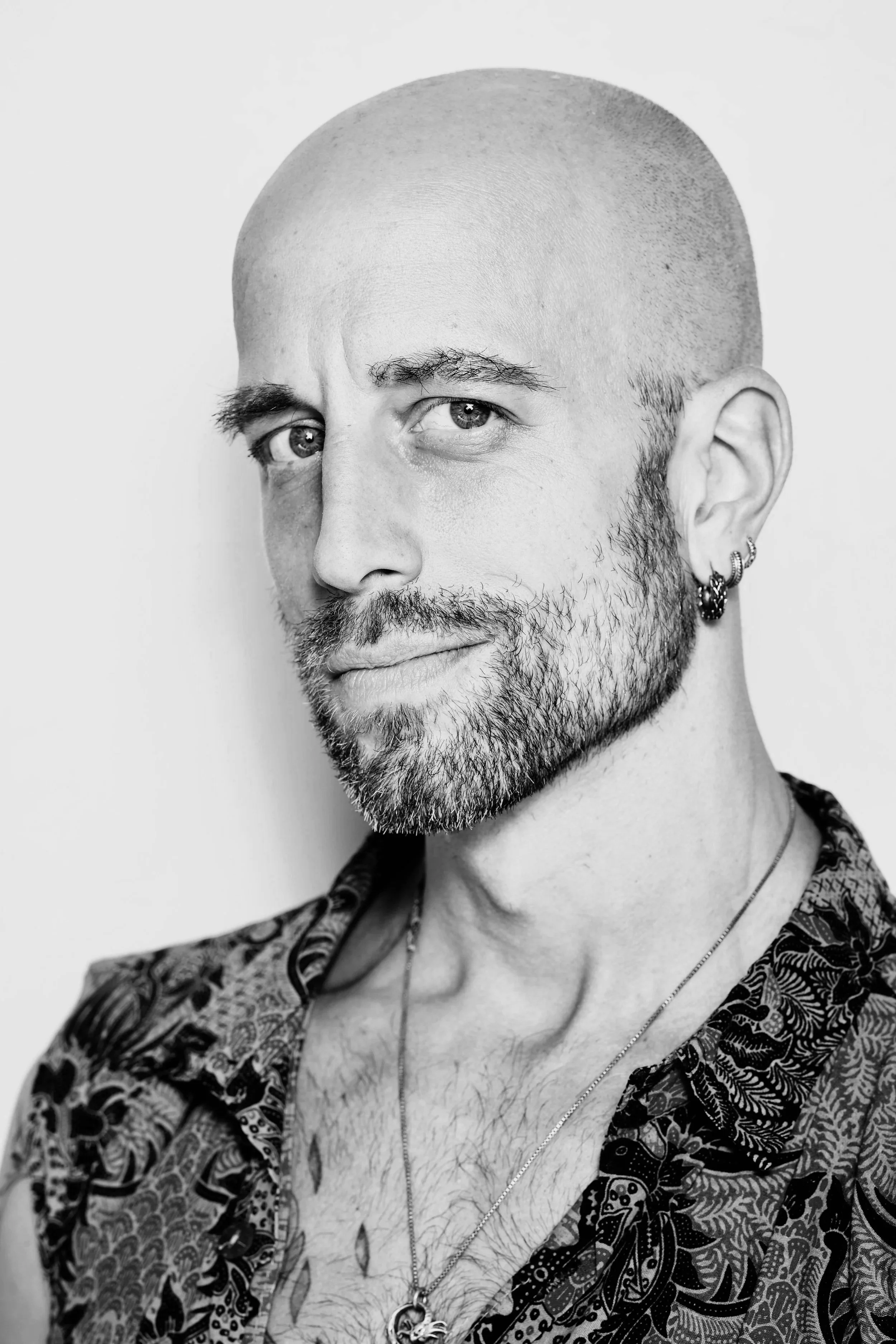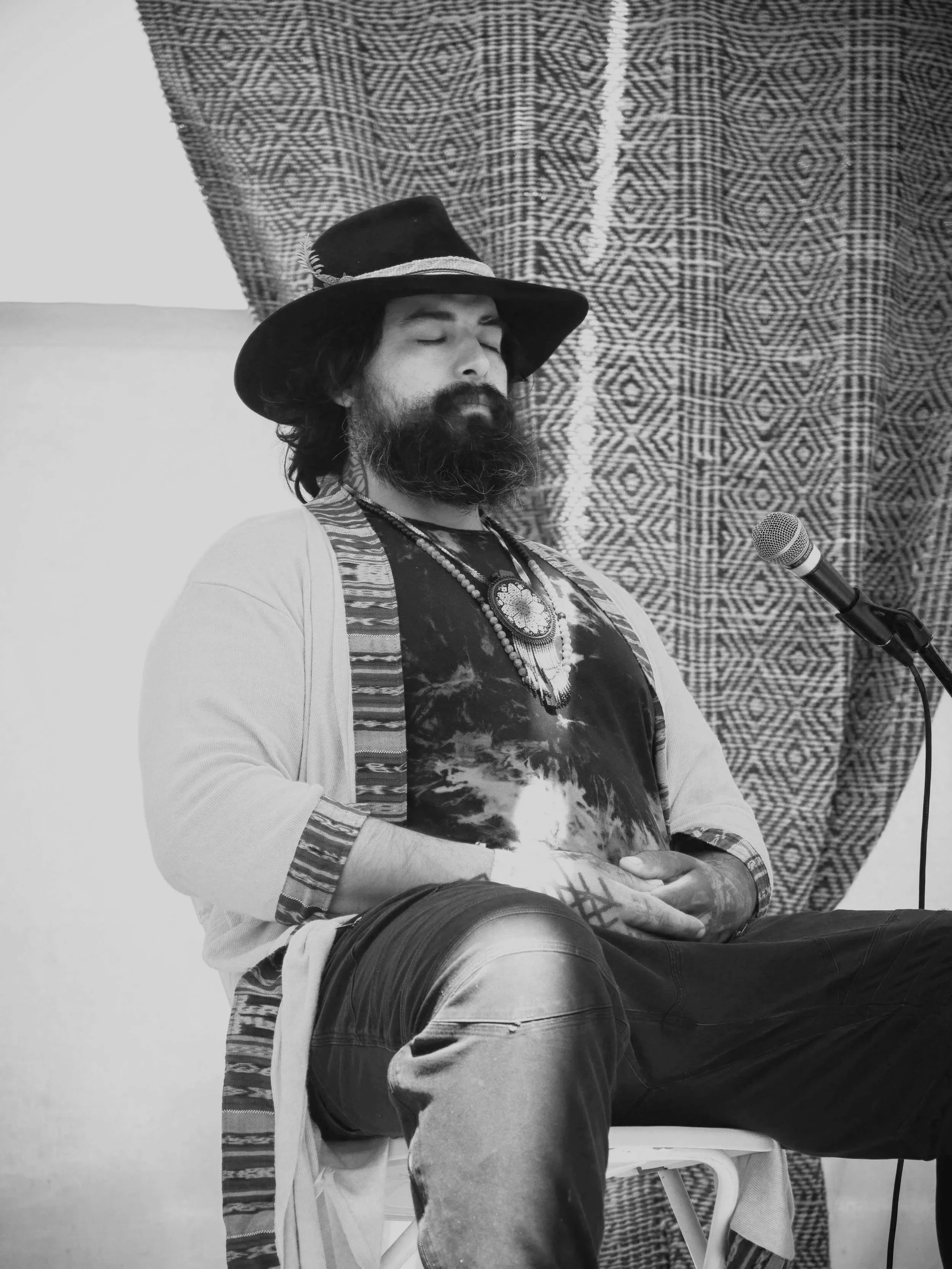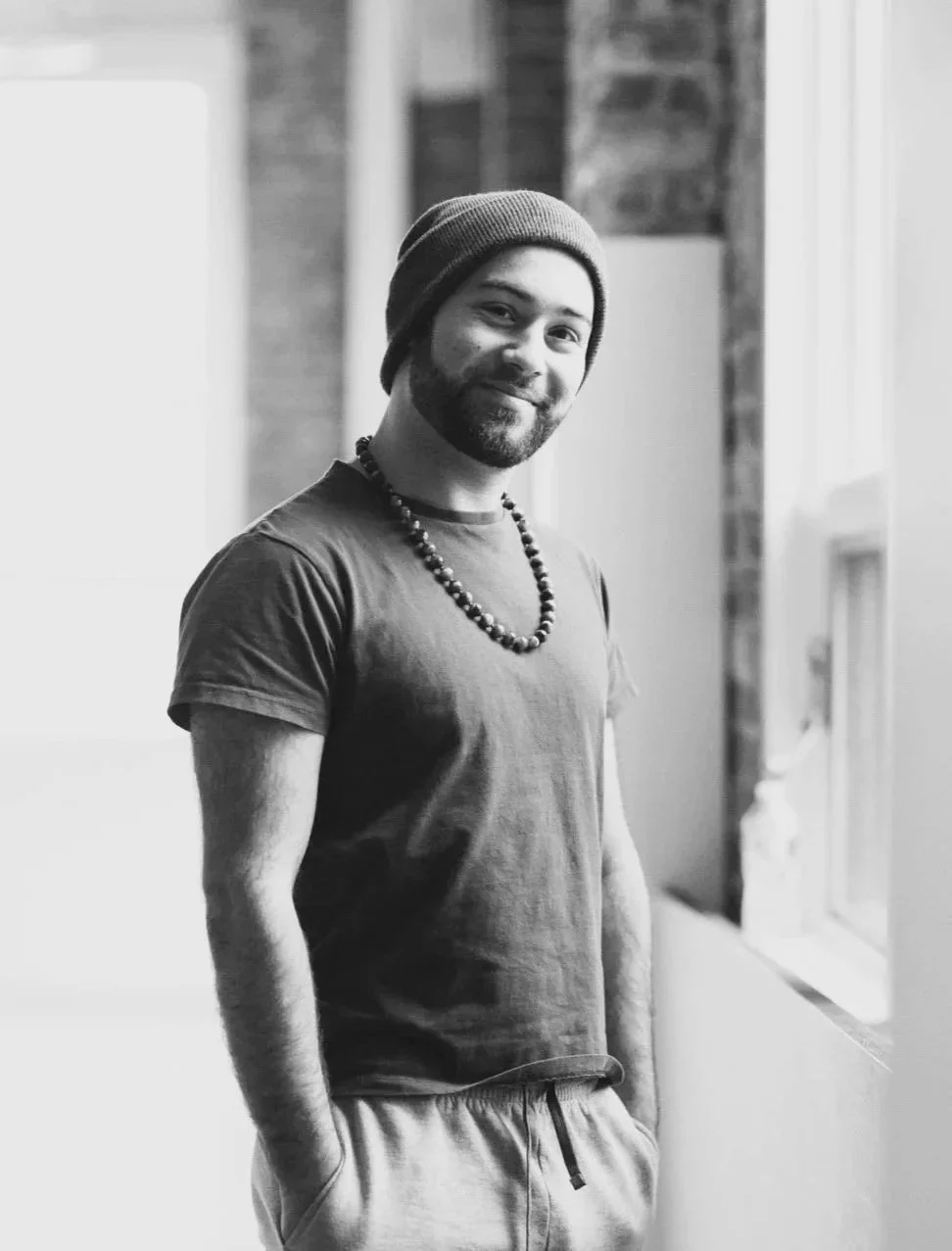Meet the Team
-

Alexandra Carelli, MA
Artist, Writer & Relational Ecologist
PhD Student Transpersonal Psychology
Founder of ThetaSoma™
-

Benjamin Moss
-

Anthony West
-

River DeLieto
-

Jacob Noah
-

Clementine Dillon
The Evolution of ThetaSoma™
The Early Years
Before Alexandra and Anthony ever crossed paths, both had spent years engaged in profound inner work, spiritual exploration, and the study of consciousness.
Alexandra’s journey began early. At age eleven, she spontaneously began meditating, learning to navigate the edges of consciousness and slip into the liminal waves of the psyche. Her path deepened through visionary experiences with psychedelics, and later through the disciplined study of yoga, Ayurveda, Buddhism, the Vedas, and other esoteric traditions. By her twenties, she had become deeply attuned to the subtle process of personal transformation and the practices required to maintain a state of self-observation, presence, and inner coherence.
Anthony, meanwhile, had spent his twenties immersed in hypnosis, neurolinguistic programming, ThetaHealing, meditation, and Western esoteric and magical practices. Through years of experimentation and refinement, he developed an early framework for accessing and shifting subconscious patterns. He shared these practices quietly and consistently with close friends and community members who sought support—devoting countless hours to understanding the psyche, altered states, somatic patterning, and the invisible mechanics of the mind.
These were the early roots of what would one day grow into ThetaSoma™.
2017 — The Roots Meet the Rising
When Alexandra and Anthony met during a pivotal moment in Alexandra’s life, a profound synthesis began. Alexandra’s intuitive gifts, academic orientation, and mythopoetic vision met the foundational practices Anthony had already spent years cultivating. Something powerful emerged in the space between them: a shared language of healing, transformation, and consciousness.
Through their collaboration, Alexandra began expanding, articulating, and shaping these early frameworks into a cohesive, teachable methodology. Her work helped the practice grow from a potent seed into a living system—one capable of touching far more lives than either could have imagined alone.
Together, they entered a period of deep somatic exploration, dreamwork, altered-state practice, meditation, trauma healing, and relational transformation. These years became the fertile soil where Anthony’s long-rooted techniques met Alexandra’s visionary development, forming the earliest recognizable structure of what would eventually become ThetaSoma™.
2019 — The First 1:1 Sessions
The emerging ThetaSoma™ process is shared with private clients for the first time. Through these early sessions, the work crystallizes into a structured one-on-one modality aimed at:
releasing childhood trauma
repatterning subconscious beliefs
restoring presence and embodied awareness
The name ThetaSoma™ is born and trademarked, symbolizing the union of consciousness, somatics, and the intuitive intelligence of transformation.
2020 — The First Guide Training
Alexandra completes her Master’s Degree in Marriage and Family Therapy and is recruited for a position as the Executive Director of a psychedelic therapy clinic. Growing demand leads to the first ThetaSoma™ Level One Guide Training Program, marking a major milestone.
The training begins one on one, but quickly grows into a small cohort that is trained to apply the methodology within their lives and communities.
2021-2022 — Deepening Embodied Wisdom and Experience
Over these two years, Alexandra facilitates over 150 psychedelic therapy sessions; hundreds of ThetaSoma™ preparation and integration sessions; and continues to focus on her studies and self-work.
This is a time of deep, embodied learning.
2023 — Advanced Level Two Training
This period marks a potent era of expansion. Working collaboratively, Alexandra and Anthony develop the ThetaSoma™ Level Two Guide Training, a training focused on advanced facilitation and multidimensional healing.
Level Two explores: archetypal energies, ancestral healing, collective trauma fields, mystical states of consciousness, symbolism & creativity, dreamwork & subtle perception.
During this time, Anthony contributes his symbolism, creativity, hypnosis background, and visionary perspectives, helping shape aspects of the advanced curriculum. This collaboration enriches the practice and ThetaSoma™ evolves.
2024 — In-Person Immersions & Embodied Transformation
ThetaSoma™ expands into in-person retreats and immersive workshops for both Level One and Level Two trainings, allowing participants to experience the method as a full-spectrum, embodied initiation.
These in-person gatherings integrate: nature connection, movement, community ritual, creativity, relational healing, dreamwork, somatic transformation.
This marks the beginning of ThetaSoma™ as a community-rooted lived experience.
2025 — Refinement, Research, Expansion & The Cosmic Soul Podcast
2025 marks a year of deepening, expansion, and creative emergence. Alexandra’s doctoral research in Transpersonal Psychology begins significantly shaping the next evolution of ThetaSoma™.
She begins to weave in: earth-based consciousness, dream studies, visionary and altered states, relational ecology, cultural deconditioning and perceptual diversity.
This further roots the method in cutting-edge psychological theory and embodied practice.
This year also marks the launch of The Cosmic Soul Podcast, co-hosted with Jacob Noah. Together, Alexandra and Jacob open a public conversation about consciousness, dreamwork, spirituality, healing, creativity, and planetary awakening. The podcast becomes an extension of the ThetaSoma™ vision — a space for collective inquiry, mythic storytelling, inner work, and the exploration of human potential.
Through these developments, the method becomes more structured, multidimensional, and aligned with both academic rigor and spiritual insight. ThetaSoma™ enters a new phase of visibility, coherence, and cultural resonance.
2026 — The Root of Transformation™ Officially Launches
Recognizing the need for a grounded, accessible entry point into the lineage, Alexandra unveils The Root of Transformation™, which is to become the foundational 8-week journey of ThetaSoma™.
Root of Transformation synthesizes the original somatic practices; the structure and rigor of the guide trainings; Alexandra’s PhD research; updated neuroscience on psychedelics and neuroplasticity; and earth-based and transpersonal frameworks rooted in relational ecology.
This offering marks a new chapter where ThetaSoma™ steps fully into its identity as a global transformational path—accessible, structured, trauma-informed, mystically grounded, and scientifically aligned.
The Future — A Movement of Perceptual Liberation
ThetaSoma™ is now more than a healing modality. It is a living, evolving consciousness movement.
As Alexandra continues to refine the methodology through academic research, visionary experience, and community practice, ThetaSoma™ is poised to guide individuals and groups into psychological sovereignty, expanded perception, relational clarity, ecological and earth-based awareness, embodied spirituality and authentic self-expression.
A growing network of guides, creatives, healers, and practitioners carry the lineage forward, weaving ancient wisdom with modern transformational psychology.
ThetaSoma™ continues to evolve — as a practice, a philosophy, and a movement — dedicated to awakening the innate intelligence that lives within every human being.
The Origin of ThetaSoma™:
A Journey of Healing & Transformation
ThetaSoma™ was born long before it had a name.
Its roots can be traced to Alexandra’s lifelong journey of healing, transformation, and spiritual initiation. From an early age, she was thrust into visionary and altered states of consciousness—beginning psychedelic work at 13, immersing herself in yoga and mysticism at 18, and walking a path of deep self-inquiry through every chapter of her life. Her healing was not theoretical—it was survival, devotion, and destiny.
In 2017, during a period of profound personal evolution, Alexandra met Anthony. Their connection was catalytic. Both had been shaped by turbulent childhoods and early exposure to trauma, and both were already committed to the work of unraveling their conditioning and reclaiming their inner freedom. Their relationship became a crucible where long-buried wounds surfaced and demanded attention.
Instead of turning away from the discomfort, Alexandra and Anthony chose to turn inward. They spent seven years engaging in a rigorous process of shared healing—exploring altered states of consciousness, meditation, ancestral repair, somatic work, creativity, hypnosis, spiritual inquiry, and the deeper architecture of the mind. They shared practices, refined techniques, and challenged each other to grow beyond the limits of their past.
What began as a private process—an intimate framework they developed to navigate the complexities of trauma and transformation—slowly distilled into something more coherent, more teachable, and more potent. During these years, the early seeds of ThetaSoma™ were planted.
As Alexandra’s academic work in Transpersonal Psychology deepened, and as she continued her study of dreams, relational ecology, trauma, and consciousness, the practice evolved. It expanded beyond the container of a relationship and into a living methodology—one rooted in neuroscience, somatics, spiritual psychology, earth-based wisdom, and the raw truth of lived experience.
Over time, ThetaSoma™ transformed from a personal healing process into a fully realized transformational path—one that could guide others through psychological deprogramming, emotional re-patterning, spiritual awakening, and expanded perceptual awareness.
Today, ThetaSoma™ is a dynamic, living system stewarded by Alexandra and a team of brilliant creatives, informed by her research as a PhD student, her lived experience, and a shared devotion to awakening human potential.
ThetaSoma™ now stands as a grounded, integrative, transpersonal methodology designed for a rapidly changing world. It supports individuals in healing at the root, reclaiming their sovereignty, and awakening the perceptual diversity needed for a new paradigm of consciousness.
This is more than a healing practice. It is a revolution of awareness—and a return to the inner intelligence that has always been guiding us home.
